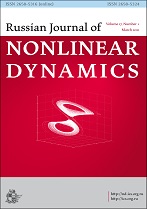|
This article is cited in 2 scientific papers (total in 2 papers)
Nonlinear physics and mechanics
Application of Genetic Engineering Techniques in the Development of Complex Electromechanical Structures for Marine Robotics
N. M. Shaitor, B. A. Yakimovich, Yu. I. Ryaskov, A. V. Gorpinchenko
Sevastopol State University,
ul. Universitetskaya 33, Sevastopol, 299053 Russia
Abstract:
The current trends in the creation of underwater robotic devices for the study of the world ocean are considered. It is noted that complex types of motion of various effectors cannot be implemented by means of simple electromechanical transducers. Therefore, the use of genetic engineering techniques to create a variety of electromechanical structures that can provide effective functionality of marine robotics objects solves a scientific problem that is of much current interest.
The aim of this work is to analyze and study the possibility of applying the principles of genetic synthesis for the development of new types of energy-efficient transducers built on the basis of complex electromechanical structures and demanded by a wide range of the developing marine robotics.
It is shown how complex electromechanical structures that satisfy a given target function are obtained using genetic operators, together with operators of geometric transformations. The use of genetic engineering techniques for the development of electromechanical transducers expands the possibilities of creating and studying the structural diversity of mechanisms with complex movement of effectors. The configuration of a wave fin propulsion device based on the inductor electromechanical transducer of axial-radial configuration is considered.
A mathematical model, methods and a program for calculating an electromechanical transducer with complex structural axial-radial configuration is developed. The problem of determining the optimal copper/steel ratio is solved, the leading dimensions are obtained and the rational relations of the parameters for calculation of the axial-radial configuration transducer with a minimum mass are established.
Calculations show that, in comparison with the traditional inductor machines with drumtype rotors, the mass of the active electromagnetic core of axial-radial type transducers can be reduced by a factor of 2.7 to 3.4 with a double reduction in volume. Axial-radial configurations of electromechanical structures designed for electric frequencies of 50 to 400 Hz are suitable for use in low-speed drives of wind and hydroelectric power plants and propulsion systems of underwater vehicles, and those designed for 1000 to 10 000 Hz can be used in high-speed drives of autonomous power plants of vehicles, aircraft, gyromotors, gas and steam turbines.
Keywords:
underwater vehicles, electromechanical structure, genetic procedure, electromagnetic chromosome, axial-radial configuration, wave propulsion device, electromagnetic core, calculation method.
Received: 02.10.2019
Accepted: 11.01.2020
Citation:
N. M. Shaitor, B. A. Yakimovich, Yu. I. Ryaskov, A. V. Gorpinchenko, “Application of Genetic Engineering Techniques in the Development of Complex Electromechanical Structures for Marine Robotics”, Rus. J. Nonlin. Dyn., 16:1 (2020), 93–103
Linking options:
https://www.mathnet.ru/eng/nd699 https://www.mathnet.ru/eng/nd/v16/i1/p93
|

|




 Contact us:
Contact us: Terms of Use
Terms of Use
 Registration to the website
Registration to the website Logotypes
Logotypes








 Citation in format
Citation in format 
